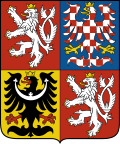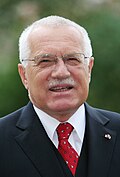Languages spoken by the presidents of the Czech Republic
All four presidents of the Czech Republic have shown proficiency in languages other than Czech. All presidents so far speak English and Russian. Václav Klaus is the president who is proficient in the most languages.
Václav Havel
Václav Havel spoke some English and used it repeatedly during his tenure as president as he was reading several speeches in English. [1] Havel most notably used his English when he gave a speech to a Joint session of the United States Congress on 21 February 1990, which he started in English but continued in Czech after a few sentences, and the speech was translated by Michael Žantovský, then spokesman of Občanské fórum. [2] Žantovský later jokingly claimed that Havel made his famous speech only to him and it was him, Žantovský, who actually spoke to US Congress. [3] Havel also knew Russian, which he learned at school. [4]
Václav Klaus
Václav Klaus is fluent in English, Russian, German, French and Italian. [4] He published a number of publications in English and German languages. Klaus stated that his proficiency with foreign languages was helped by studies of international trade at the Prague University of Economics and Business, where he was required to learn at least three foreign languages. [5]
Miloš Zeman
Miloš Zeman speaks some English, Russian, and German. He used English and Russian during his tenure while talking to foreign politicians. [6] [7]
Petr Pavel
Petr Pavel is fluent in English, Russian, and French. [4] Pavel reportedly has known English well since his youth, which helped his career in the army as only few people there knew the language. [8] Pavel learned French during an intelligence course in 1988–89. [9]
This page is based on this
Wikipedia article Text is available under the
CC BY-SA 4.0 license; additional terms may apply.
Images, videos and audio are available under their respective licenses.





